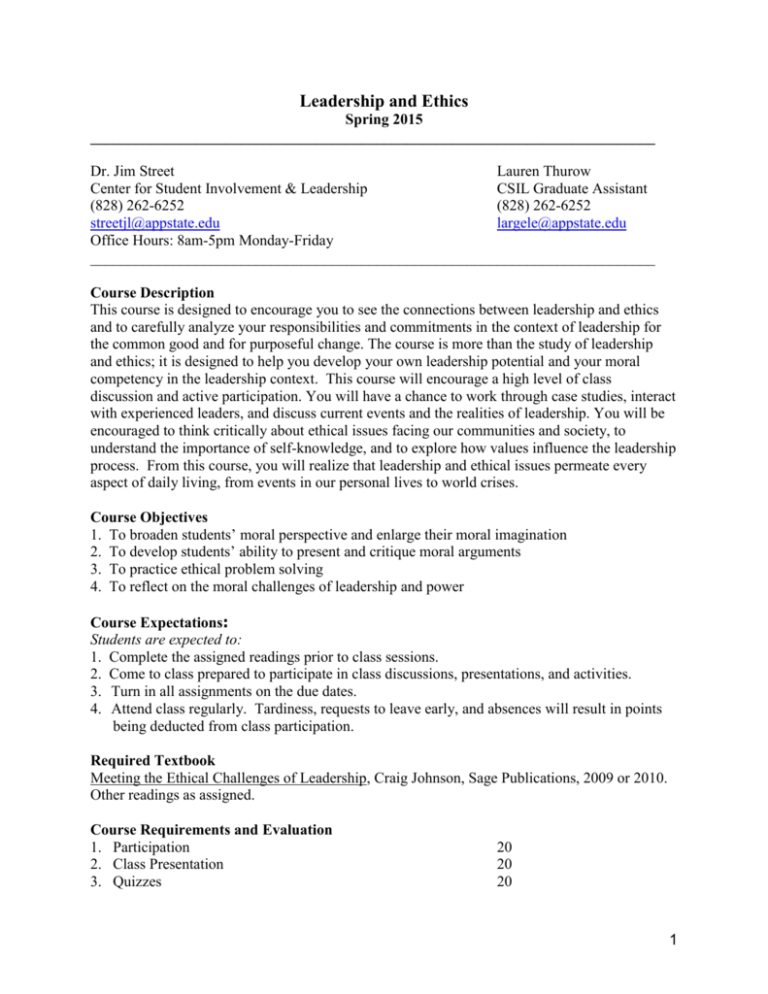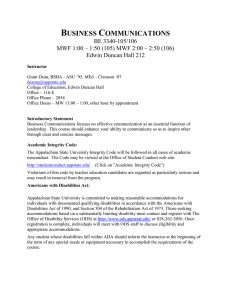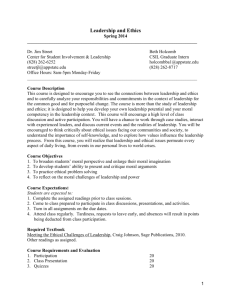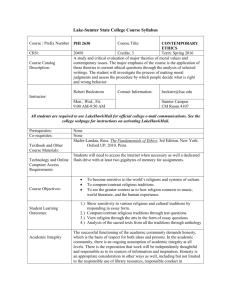HPC 3537 spring 2015 - Syllabi
advertisement

Leadership and Ethics Spring 2015 ___________________________________________________________________________ Dr. Jim Street Lauren Thurow Center for Student Involvement & Leadership CSIL Graduate Assistant (828) 262-6252 (828) 262-6252 streetjl@appstate.edu largele@appstate.edu Office Hours: 8am-5pm Monday-Friday ___________________________________________________________________________ Course Description This course is designed to encourage you to see the connections between leadership and ethics and to carefully analyze your responsibilities and commitments in the context of leadership for the common good and for purposeful change. The course is more than the study of leadership and ethics; it is designed to help you develop your own leadership potential and your moral competency in the leadership context. This course will encourage a high level of class discussion and active participation. You will have a chance to work through case studies, interact with experienced leaders, and discuss current events and the realities of leadership. You will be encouraged to think critically about ethical issues facing our communities and society, to understand the importance of self-knowledge, and to explore how values influence the leadership process. From this course, you will realize that leadership and ethical issues permeate every aspect of daily living, from events in our personal lives to world crises. Course Objectives 1. To broaden students’ moral perspective and enlarge their moral imagination 2. To develop students’ ability to present and critique moral arguments 3. To practice ethical problem solving 4. To reflect on the moral challenges of leadership and power Course Expectations: Students are expected to: 1. Complete the assigned readings prior to class sessions. 2. Come to class prepared to participate in class discussions, presentations, and activities. 3. Turn in all assignments on the due dates. 4. Attend class regularly. Tardiness, requests to leave early, and absences will result in points being deducted from class participation. Required Textbook Meeting the Ethical Challenges of Leadership, Craig Johnson, Sage Publications, 2009 or 2010. Other readings as assigned. Course Requirements and Evaluation 1. Participation 2. Class Presentation 3. Quizzes 20 20 20 1 4. Reflection Papers 5. Service Project 6. Final Exam Total Possible 20 10 10 100 points Attendance More than 3 absences will adversely affect your grade. Leadership Ethics Assignments Participation – assessment based on in-class participation and completion of particular assignments (e.g., Personal Shadows Paper, Personal Mission Statement, Core Values) Class Presentation – Students will be assigned to a group and topic. Presentations should be 1 hour and 15 minutes. The group will be evaluated based on quality of presentation, effort given, and learning. Use a variety of teaching methods: lecture, large/small group discussion, personal assessments, experiential learning, etc. Quizzes – For every Chapter 1-10. Your lowest grade will be dropped. Reflection Papers – Students will write a reflection paper on topics related to class. At least 1.5-2 pages (double spaced, 1-inch margins) Paper 1 – Share a personal experience with an ethical issue Paper 2 – Students will write a paper picking either Kohlberg or Perry and analyze how the theories personally apply Paper 3 – Reflect on one of the group topic presentations (not your own) and how the topic applies to ethics Paper 4 – Write about the ethical consideration(s) of a social justice presentation or event on campus Service Project – In small groups, students will perform 4 hours of service for a local non-profit. While working with the agency, find out why they exist and what ethical issues surround the work they do. Each group will present their findings to the class. Final Exam – What it is. Statement of Academic Integrity As a community of learners at Appalachian State University, we must create an atmosphere of honesty, fairness, and responsibility, without which we cannot earn the trust and respect of each other. Furthermore, we recognize that academic dishonesty detracts from the value of an Appalachian degree. Therefore, we shall not tolerate lying, cheating, or stealing in any form and will oppose any instance of academic dishonesty. This course will follow the provisions of the Academic Integrity Code, which can be found on the Office of Student Conduct Web Site: www.studentconduct.appstate.edu. 2 Accommodations for Students with Disabilities Appalachian State University is committed to making reasonable accommodations for individuals with documented qualifying disabilities in accordance with the Americans with Disabilities Act of 1990, and Section 504 of the Rehabilitation Act of 1973. Those seeking accommodations based on a substantially limiting disability must contact and register with The Office of Disability Services (ODS) at http://www.ods.appstate.edu/ or 828-262-3056. Student Religious Observance Students must be allowed a minimum of two (2) excused absences each academic year for religious observance required by the faith of a student. Written notice must be given to each instructor no later than three weeks after the first class day of the term. 3











